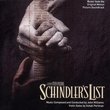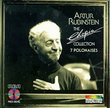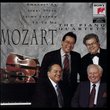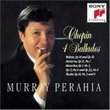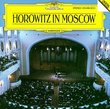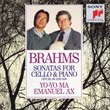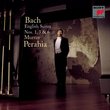| All Artists: Wolfgang Amadeus Mozart, Zubin Mehta, Israel Philharmonic Orchestra Title: Mozart: Sinfonia Concertante Members Wishing: 0 Total Copies: 2 Label: Deutsche Grammophon Release Date: 10/25/1990 Genre: Classical Styles: Forms & Genres, Concertos, Symphonies, Historical Periods, Classical (c.1770-1830) Number of Discs: 1 SwapaCD Credits: 1 UPC: 028941548627 |
Search - Wolfgang Amadeus Mozart, Zubin Mehta, Israel Philharmonic Orchestra :: Mozart: Sinfonia Concertante
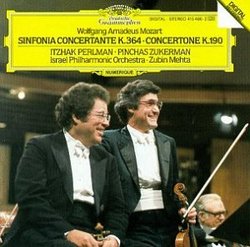 | Wolfgang Amadeus Mozart, Zubin Mehta, Israel Philharmonic Orchestra Mozart: Sinfonia Concertante Genre: Classical
![header=[] body=[This CD is available to be requested as disc only.]](/images/attributes/disc.png?v=15401716) ![header=[] body=[This CD is available to be requested with the disc and back insert.]](/images/attributes/disc_back.png?v=15401716) ![header=[] body=[This CD is available to be requested with the disc and front insert.]](/images/attributes/disc_front.png?v=15401716) ![header=[] body=[This CD is available to be requested with the disc, front and back inserts.]](/images/attributes/disc_front_back.png?v=15401716) |
Larger Image |
CD DetailsSimilar CDs
Similarly Requested CDs |
CD ReviewsSpectacular live performance Peter Goldstein | Huntingdon, PA United States | 12/02/1999 (5 out of 5 stars) "Mozart's Sinfonia Concertante is one of his most beautiful works, and here it gets one of the most remarkable performances I've ever heard. It has the sort of joy and expressiveness you can only find in a live performance. But there's a caveat: you have to like your Mozart big-orchestra and romantic. If you don't (and I don't, but I appreciate the musicianship here), you'll find yourself wondering what the piece really sounds like. If you do, this disc has absolutely no peer." Hearing the Enjoyment Andrew Filmer | Bangkok, Thailand | 04/27/2004 (4 out of 5 stars) "This recording was probably the best at the time of its release and some time after, and one of the other reviews is right in that it contains a more "live" sound than would be some others with much studio editing. Perlman gives his signature warm sound, and Zuckerman is probably the most notable violinist to also champion the viola. One hears the enjoyment in the music, which is what makes Perlman in particular so special as a musician. I give it 4, not 5 stars, though, because the last star must be reserved for the much newer recordings of Augustin Dumay/Viktoria Hagen/Salzburg (for one of the best interpretations of Mozart ever) and that of the Orpheus Chamber Orchestra (for a better understanding of how the work is as symphonic as it is concertizing)." CONCERTED EFFORT DAVID BRYSON | Glossop Derbyshire England | 08/30/2006 (5 out of 5 stars) "Why is Mozart's great double concerto for violin and viola called `Sinfonia Concertante'? I am only assuming provisionally that Mozart himself used the term - his voluble correspondence never (so far as I know) refers to the work. This is now the second performance of it in my collection, the first being a Supraphon production from 1962 issued on a Classics for Pleasure LP with Suk and Skampa as soloists. I betook myself to the oracles of Volker Scherliess (here) and W A Chislett (CfP) for guidance regarding the work's title but came away none the wiser. Chislett plays the hoary old game of telling us something true but irrelevant, namely that the title `sinfonia concertante' was applied to works harking back to the old concerto grosso style, with a `concertino' group of soloists balanced against the main band. True enough elsewhere, completely irrelevant here, so knickers to Chislett. Scherliess takes the route of veiled hints `a symphonically constructed work (similar but not identical in form to the concerto)'. Neither symphonic in any sense say I, and neither similar nor `identical' to a concerto, but simply that -- a concerto, just like Mozart's piano concertos. Mozart himself sees to the cadenzas just as Hummel does in his own double concerto for violin and piano, and no doubt for the same reason, namely that leaving two soloists to improvise would have been courting disaster.
We have here a live performance from 1982 at the Huberman festival in Israel. The applause is suppressed and the playing is as polished as in any studio account, but there is the sense of spontaneity that nearly always gives a special feel to live music. Speeds are fairly normal: the opening allegro maestoso has the proper majesty in its marching rhythm, the andante has the right soulfulness and sadness about it. The final `presto' is not particularly fast, a good deal more measured than the way Suk and Skampa take it, but lively, spirited and elegant. This being Mozart and not Haydn, I like it well enough like this. Zukerman takes the viola part, as it is thought Mozart did at the work's premiere, and he performs it as to the instrument born, just as Nigel Kennedy does in Walton's viola concerto or as Menuhin does in the 6th Brandenburg in his Bath Festival set. The `Concertone' is highly welcome, being as rarely performed as it is. This is really a work that retains suggestions of the concerto grosso, although unmistakably late 18th century, after Haydn had transformed the idiom of instrumental music from being purely a process of development into one in which events and contrasts take place. As well as the two violins, there is a solo oboe and a solo cello, these parts being fully as prominent as those for the fiddles. It is an early piece and not the greatest Mozart by any means, but Mozart had a star on his brow from his most juvenile efforts onwards. As in the great work that comes with it here, the contribution of everyone is top-class. I was intrigued as to how the artists would interpret the tempo indication on the last movement `Tempo di Menuetto. Vivace.' On the face of it these instructions look mutually contradictory, as `tempo di' normally indicates a slowish minuet, but it is all convincing enough as done here, and certainly I have no better suggestions. The liner note, or at least the one that comes with the disc in England, is journeyman stuff, but one is used to that. The recorded quality is very good without being exactly spectacular, and one would not be aware of the presence of an audience in any unwelcome ways. All very recommendable indeed, not least to those previously unfamiliar with the concertone." |

 Track Listings (6) - Disc #1
Track Listings (6) - Disc #1
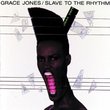
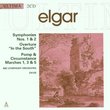
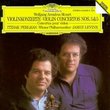
![Brahms: Ein deutsches Requiem [A German Requiem]](https://nationalbookswap.com/cd//m/23/8723/6058723.jpg)

